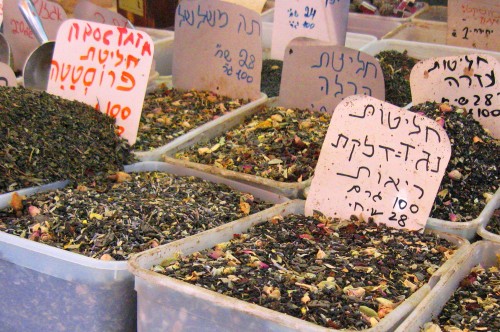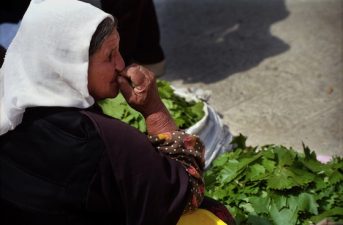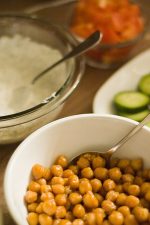 Miriam continues the fourth part of her series on medicinal herbs from the Middle East.
Miriam continues the fourth part of her series on medicinal herbs from the Middle East.
To keep things simple for this series, we’re only considering the medicinal properties of dried seasonings. (See parts I, II, and III here on Green Prophet.)
Some herbs don’t amount to much when dried. Basil, parsley, and coriander leaf, for example, lose most of their taste and all of their medicinal value, in dried form. And the only use we can think of for garlic powder is to dust it over popcorn. Sometimes the line blurs between spice and herb. Green herbs like basil, rosemary, and oregano are herbs – but when dried, they’re considered spice.
Oregano: a powerful antiviral and antibiotic. Make a steam inhalation of oregano (instructions follow) at the first sign of a cold or flu, and you may escape the illness. It’s not a magic bullet, though – viruses have to be attacked on all fronts. Getting more rest, taking Vitamin C and echinacea, drinking plenty of warm fluids – Grandma’s standard advice. An oregano inhalation will at least relieve headache and clear your sinuses.
For acne, steaming the face with hot oregano tea will cleanse the skin without drying it out. Oregano brings out impurities in the skin, so the acne may be more evident for a day or two after steaming, but routine gentle cleansing and a steam treatment twice weekly will give your teenager clearer, brighter skin after a week or two.
How to make a steam inhalation or steam facial treatment:Boil 1 cup of water; add 1 tablespoon of herb or spice. Put the hot liquid in a bowl and set it down on a table. Have a large towel handy. Lean towards the steaming bowl and cover your head with the towel, trapping the steam so that it bathes the face and you breathe it in. Turn your head from side to side to get the most benefit. If the steam is too strong, don’t suffocate yourself, just let a little fresh air in, or put your head out of the towel. Just 2-5 minutes is usually enough.
Black Pepper: History says that Attila the Hun demanded, among other things, 3,000 lb. of pepper in ransom for the city of Rome. We don’t think Attila had medicine in mind for all that pepper, but it does have strong medicinal properties.
Pepper stimulates digestion and relieves flatulence and nausea. Like most herbs with these properties, it also stimulates the appetite.
To use it as medicine, grind 6 or 7 peppercorns. Put the ground pepper in a spoon and pour honey over it. Then swallow the whole (but, er, not the spoon).
This same pepper/honey mixture relieves hoarseness and and cough. A good thing to keep in mind if you need to give a presentation or a speech.
Rosemary: A shrub native to the Mediterranean and Middle East, rosemary doesn’t need much water to thrive – a good garden herb for dry climates.
Relieve ordinary headaches, and loosen up stressed nerves, with a cup of rosemary tea.
Take a sprig of the herb (fresh or dried) and allow it to steep for 5 minutes in a cup of water that just boiled. Keep the infusion covered while it’s steeping, or the goodness will evaporate instead of staying in the cup.
Rosemary tea stimulates circulation and gives a feeling of warmth to the body. It’s also a good morning eye-opener, only it won’t raise your blood pressure like coffee. One-half cup is enough.
For nursing mothers, rosemary’s high calcium content helps make milk. The dose is one-half cup twice daily for no longer than three days.
Please remember: more is not better with medicinal herbs, any more than with conventional meds. Stick with the guidelines for therapeutic dosage because any medicine is toxic if you take too much of it.
Rosemary isn’t safe in pregnancy, as it’s ability to move blood may cause miscarriage. The other side of this is that a daily sitz bath of rosemary infusion is useful in tonifying the uterus after birth.
How to make an herbal sitz bath: Recycle a large soda bottle – the 2-liter ones are best. Cut the top third off (you’ll have to saw through the bottle with a knife or heavy scissors). Wash the remaining part with hot water and soap. Fill it halfway with hot rosemary tea and place it inside the toilet bowl. It won’t tip over. Now pull down your undies and sit over the steaming tea for 15 minutes. Do this twice daily for three days.
Rosemary tea especially cleanses the uterus after menstruation or childbirth (wait at least three weeks after birth to do this, though, as till then the womb is still very tender). We have known this treatment to help clear out benign ovarian cysts.
While these herbs aren’t in alphabetical order here, sage and raspberry leaf tea, made into a sitz bath as described above, effectively reduce hemorrhoids. It has to be done twice daily till relief is obtained – usually within a few days.

Medicinal teas of dried herbs and spices at the Carmel open-air market, Tel Aviv. The signs read: “Prostate Infusion,” “Laxative Tea,” “Infusion for Pneumonia,” and one discreetly labeled “Helpful Infusion.”
More on green food and savings:
Photos by Miriam Kresh




Why, thank you, Karin. It's cool to live in the Middle East,where herb-based home remedies are still respected.
Great tips Miriam. They get more interesting as the series rolls forward. I especially like the tips about rosemary and oregano, such dominant herbs in the Middle East. And the picture of the remedies from the market…